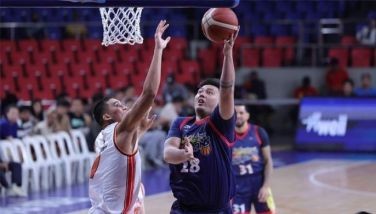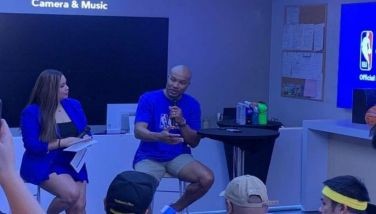Reaching out to Manny
The Department of Neurosciences of the Makati Medical Center is moving heaven and earth to provide more services to indigent patients who require specialized attention for brain afflictions with head Dr. Regina Macalintal-Canlas leading the efforts to reach out to the poor who are not financially capable to receive treatment.
“We are constantly trying to upgrade our facilities and doing research to keep up with technology,” said Dr. Canlas. “As a boxing fan myself, I realize fighters are vulnerable to brain disorders. At the Makati Medical Center, we have a health service program where we assist the poor and facilitate financial assistance from sources like the PCSO. Our doors are open to boxers who may be suffering from some form of dementia, depression or a kind of brain disorder.”
Within the department is a multi-disciplinary subspecialty center called the Movement Disorders Clinic that examines and treats patients with abnormal movements caused by Parkinson’s disease, tremors and dystonia.
The primary practitioners in the center are Dr. Cid Czarina Diesta, a movement disorder neurologist and Dr. Jean Quint Oropilla, a functional neurosurgeon. The center is linked to the hospital’s geriatric center, memory clinic and neuropsychologic and neuropsychiatric services.
“We have international ties for research purposes and for genetic testing with the Massachusetts General Hospital in Boston and the University of Luebeck in Germany,” said Dr. Diesta. “Makati Medical Center also has direct ties with Stanford. We offer standard of care evidence-based medical treatment, chemodenervation involving botulinum toxin injections and genetic counselling.” The center is one of only two facilities in the country offering surgical management through deep brain stimulation, a process in which electrodes are passed into the brain through a controlling device similar to a heart pacemaker.
Dr. Diesta said there is a specific equipment used to perform the deep brain stimulation. It’s a P6 Million machine that the center currently rents from a company called Medtronic whenever required by a patient. At the moment, the procedure costs between P1.8 to 2 Million. If the center finds a sponsor for the machine, the cost to patient will be lowered as the rental is an additional expense.
“The equipment for the surgery is highly specialized and the hospital has never been able to justify the high expense of purchasing a unit,” said Dr. Diesta. “Due to the extreme expense of deep brain simulation, it is not affordable to most of our patients. Since 2003, less than 20 cases have been performed in the Philippines, most with subsidies from charitable institutions.”
Dr. Diesta said in 2014, a 47-year-old woman Irene Navarro underwent the deep brain stimulation procedure at the Makati Medical Center. “She had been suffering from Parkinson’s for 10 years,” said Dr. Diesta. “Some of her siblings also suffered from the syndrome so it was familial. When she was discharged, we found out her bill was paid for by Manny Pacquiao, something like P2 Million. Mr. Pacquiao did it without fanfare, without anyone knowing and we are grateful for his generosity and sincerity.”
Dr. Diesta said recent changes in pricing by Medtronic have made treatment through deep brain stimulation even more prohibitive. “Our center has locally and directly done four deep brain stimulation procedures in the last eight months,” she continued. “We have five patients actively gathering funds and seeking charitable support and many more who are direct candidates but cannot pursue it.”
Dr. Diesta said the deep brain stimulation patients are afflicted with either Parkinson’s disease or X-linked dystonia parkinsonism (XDP). “What consumes more of our attention are the XDP patients,” she said. “XDP or what we call ‘lubag’ is a progressive degenerative neurologic disease, endemic to the Philippines, specifically traceable to the island of Panay. All XDP cases in the world are reported to have originated from Panay. Unfortunately, it is one of the poorest regions in the country, at the same time, requiring more care. XDP strikes affected males in their prime, rapidly turning them fully disabled and requiring constant care. Many die from complications in the fifth to seventh year of diagnosis.”
Dr. Diesta said the Movement Disorders Society of the Philippines is directly involved in managing charity XDP patients in Roxas City and participates in international research studies involving epidemiology, genetics, medical management and surgery. “On occasion, together with the society, we fly out to Roxas City to see patients,” she added. “It is a common frustration to interview post-deep brain stimulation patients who are once again ambulant and have regained health, returned to work and independence only to come to the charity clinic with siblings and relatives who are not so fortunate and are slowly wasting away before their eyes.”
Dr. Canlas said the department is reaching out to Sen. Pacquiao for assistance in procuring the deep brain stimulation machine. “We’ve been striving these last few years to accommodate our less fortunate countrymen,” she said. “With the Medical Disorders Society of the Philippines and the Philippine Neurological Association, we have advocated this year additional support from Philhealth through the rare diseases act. Makati Medical Center has its own liaison to the PCSO and has streamlined paperwork and cooperation necessary for application.” A letter to Pacquiao was sent yesterday in this regard.
Dr. Diesta said the deep brain stimulation procedure may not be applicable to boxers with pugilistic dementia. She mentioned the case of celebrated Hall of Fame boxing trainer Freddie Roach who has suffered from Parkinson’s over the last 30 years but continues to work the mitts with fighters. “With coach Freddie, the procedure may not be necessary as it appears that medication is working well,” she said. “In performing deep brain stimulation, we actually implant the device in the brain and it is linked to a battery pack we put in the lower part of the clavicle so that there will be difficulty in fully extending the arm. Coach Freddie’s work in the gym requires full extension of his arms.”
Dr. Canlas said while Roach is in town training Pacquiao for his next fight against Jessie Vargas, the department would be honored if he could visit the Makati Medical Center. “It would be a distinct honor and privilege for coach Freddie to visit us in the hospital because he’s such an inspiration not only to patients but also to our doctors,” she said.
- Latest
- Trending































